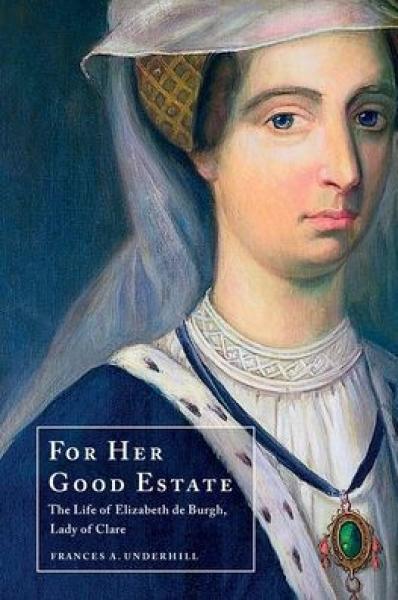Description
Limited power; extraordinary influence. The strategies, friendships, and enduring impact of a remarkable C14th noblewoman.
Elizabeth de Burgh showed feisty spirit in adversity and imprisonment, war and plague - and she and her friends were influential patrons of books and all arts while English craftsmanship was at its finest. Her legacy includes Clare College and Clare Hall in the University of Cambridge, and a treasure trove of records illuminating the contrasting reigns of her uncle Edward II and cousin Edward III.
Her early life was tumultuous: an arranged marriage; an abduction leading to a clandestine second marriage; a forced marriage to a royal favourite who died a traitor. At age 26, she had been widowed three times, with a child from each marriage. She suffered arrest, confinement and asset confiscation during years of civil war, before regaining control of her estates after Queen Isabella's invasion. Empowered by a vow of chastity to ensure her independence, she thrived in her long widowhood as a capable administrator, an engaged mother and grandmother, with a talent for enduring and multigenerational friendship. She became a shrewd philanthropist, founding the Franciscan friary at Walsingham and endowing Clare College, Cambridge.
Frances Underhill's biography shows how Elizabeth overcame gender limitations to attain both prestige and lasting influence. Additional essays in this edition explore the invasion of 1326, the visual statements of Elizabeth's seals, and her later place in the network of artistic patronage at a time of stimulating ideas, enduring architectural treasures, fine textiles and beautiful manuscripts.
Centuries later, Elizabeth's ringing introduction to the Clare College statutes continues to inspire, and new generations of scholars pursue the Precious Pearl of Learning.
Life of a spirited C14th noblewoman who lived through adversity and imprisonment, civil wars and plague. She became a shrewd philanthropist, patron of a Cambridge college and of all the arts, at a time of intellectual ferment and artistic magnificence.
Frances A. Underhill taught medieval history at the University of Richmond for twenty-eight years and was Professor of History, Emerita, from 1991 until her death in 2017. She loved teaching and interacting with students, and received the Distinguished Educator Award three times. 'For Her Good Estate' reflects Professor Underhill's fascination with Elizabeth, a complex and evolving woman, and how her devotion, determination, expanding vision and purposeful creativity produced an intellectual legacy that has endured for centuries.
Dr Jennifer Ward spent much of her career teaching and researching at Goldsmiths College, University of London. She has written extensively on medieval women, and is still making new discoveries in the voluminous archives relating to Elizabeth, a lifelong interest.
Dr Margaret M. Smith is an alumna of Clare Hall, retired reader in Book Design History at the University of Reading, and Honorary Curator of the Clare Ancient House Museum.
The Clare accounts have often been drawn on by previous historians, but mainly for particular purposes and never so comprehensively as here... From these pages there emerges a fresh and distinctive personality. Elizabeth was above all both capable and intelligent. She had shown her mettle early on, during the vulnerable first years of her final widowhood in the 1320s, when she had manoeuvred for survival under the tyranny of the Despensers. Thereafter she effectively withdrew from court politics, taking a vow of chastity which freed her from further marital pressures and devoting herself to her children, grandchildren and wider family, an active and hospitable social life, the supervision of a large household and estate, and to good works. Her reading, her educational enterprises (chief among them Clare Hall at Cambridge), and her circle of clerks and churchmen, all suggest a more than conventionally religious and serious-minded lady; though she was also one who moved with brio and élan in secular and aristocratic society. If her close friendship with Henry of Lancaster, author of Le livre de seyntz medicines, might have been expected, her equally close relationship with the Black Prince, her frequent guest in the years after Poitiers, was perhaps less predictable. The affection and respect which she plainly inspired owed something to her little acts of kindness and generosity: the bequest, for example, of her small chariot to its driver, in a thoughtful gesture towards his future employment. Here and in other minutiae - the purchase of almonds for her pet parrots, the gift of two spaniels to her daughter-in-law, Matilda de Burgh - she comes most vividly to life. Her biographer has quarried all this material assiduously, effectively and with quiet good judgement, writing clearly and with a sharp critical sense.
John Maddicott, Exeter College, Oxford... engaging, detailed, and impressive in its breadth and use of sources... an accomplished, elegant, and thorough study of a fascinating subject.
Linda E. Mitchell, Alfred UniversityWe understand Elizabeth as one of the small number of influential patrons who shaped Gothic art and architecture in England. So much was destroyed. Yet tantalising fragments remain, with surviving treasures in wood and gold, silk and stone; we have evidence from both images and words. These allow the imagination to soar, conjuring up a picture of magnificence. Books such as For Her Good Estate touch on so much, and are invaluable in helping us to visualize an entire era. Paul Binski, University of Cambridge
Product Details
- Moonwort Press Brand
- Nov 17, 2020 Pub Date:
- 1916376800 ISBN-10:
- 9781916376809 ISBN-13:
- 372 Pages
- 9.21 in * 6.14 in * 1.01 in Dimensions:
- 2 lb Weight:




